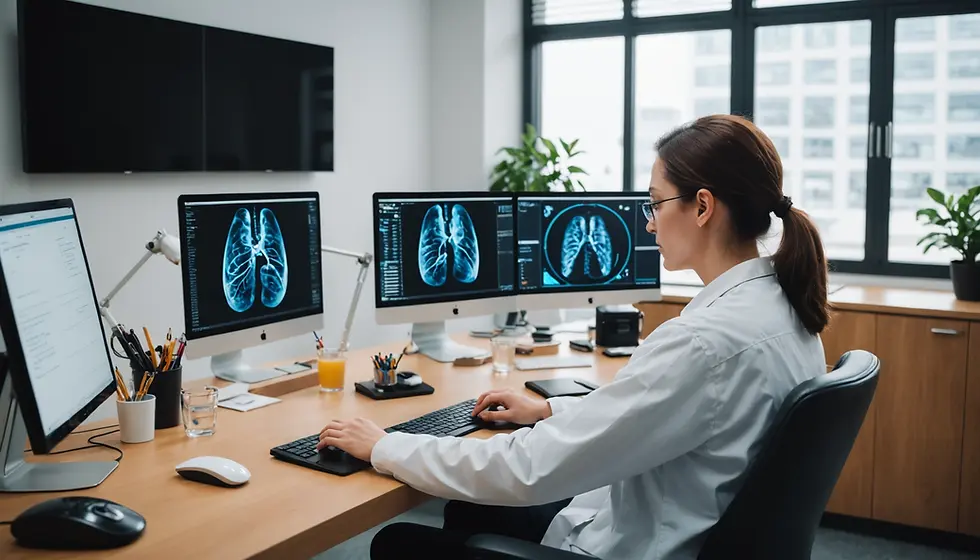Revolutionizing Healthcare: The Impact of Artificial Intelligence in Clinical Laboratories
- IchiMeow Ninja
- Sep 19, 2025
- 3 min read
Artificial Intelligence (AI) is changing many industries, and healthcare is a key area of focus. In clinical laboratories, AI is making a big difference by improving efficiency, accuracy, and patient care. This blog post examines the substantial impact of AI on clinical laboratories from a MedTech viewpoint, showcasing its benefits, challenges, and future potential.
The Emergence of AI in Clinical Laboratories
The rise of AI in clinical laboratories marks a major change in how lab processes are managed. AI tools like machine learning and natural language processing are being used to analyze large amounts of data quickly and accurately. For example, a study found that AI can analyze medical images up to 30% faster than human experts, leading to quicker diagnoses.
AI systems can also interpret complex data sets, such as genomic sequences and MRI results, much more efficiently than traditional approaches. This capacity is vital in a field where the speed and accuracy of results can directly influence patient care.
Enhancing Diagnostic Accuracy
One of AI's most valuable contributions to clinical laboratories is improving diagnostic accuracy. Traditional methods often involve human judgment, which can lead to errors. In contrast, AI algorithms can analyze data with a degree of precision that reduces these mistakes. For instance, AI systems can identify subtle patterns in lab results that a human analyst might miss. According to recent research, AI has improved diagnostic accuracy by up to 15% in certain cancers.
AI also aids in the early detection of diseases. By evaluating historical patient data, AI can recognize trends and alert professionals to potential health issues before they escalate. This proactive approach enhances patient outcomes and eases the strain on healthcare systems, potentially reducing hospital admissions by as much as 20%.
Streamlining Laboratory Workflows
AI plays a crucial role in streamlining laboratory workflows. By automating routine tasks like sample sorting and data entry, lab technicians can concentrate on complex analyses. For example, a major laboratory implemented AI to handle routine data management, which resulted in a 40% reduction in processing time.
Additionally, AI optimizes resource allocation within laboratories. By forecasting testing demand and managing inventory levels, AI systems ensure that labs function at peak efficiency. This capability is especially vital during high-demand scenarios, such as flu season or public health crises.
Improving Patient Care
Ultimately, all healthcare innovations aim to enhance patient care, and AI is no exception. AI enables faster, more precise diagnostic results, allowing healthcare providers to make quick, informed decisions. This is particularly crucial in emergencies where every second counts.
Furthermore, AI can aid in personalized medicine, analyzing individual patient data to suggest customized treatment plans. This tailored approach improves treatment efficacy while minimizing adverse reactions, leading to a more positive healthcare experience. For example, personalized treatment plans derived from AI data analysis have been shown to increase patient satisfaction rates by over 25%.
Challenges and Considerations
Despite the many benefits of AI in clinical laboratories, there are challenges that must be tackled. A primary concern is data privacy and security. AI relies on vast amounts of sensitive patient information, raising significant questions about data storage and protection. According to a survey, nearly 60% of healthcare providers express concerns about the security of patient data in AI systems.
Additionally, regulatory frameworks need to evolve to ensure that AI technologies are both safe and effective. As AI solutions continue to grow, regulatory bodies must provide clear guidelines to protect patients while encouraging innovation.
The Future of AI in Clinical Laboratories
The future of AI in clinical laboratories looks bright. As technology progresses, we can expect even more advanced applications that boost lab capabilities. For example, the merger of AI with technologies like blockchain and the Internet of Things (IoT) could lead to groundbreaking improvements in data management, ensuring better patient outcomes.
Moreover, continuous research and development in AI are likely to produce new algorithms capable of addressing complex medical challenges. As these technologies become more widely available, clinical laboratories will be better prepared to meet the evolving demands of modern healthcare.

The Path Forward
The influence of artificial intelligence in clinical laboratories is undeniably significant. From enhancing diagnostic accuracy to streamlining workflows and improving patient care, AI is changing how laboratories function. While challenges persist, the potential advantages of AI in the MedTech sphere are immense.
As we continue to explore AI capabilities, it is crucial for medical technology professionals and students to stay updated on these advancements. Embracing AI prepares the next generation of healthcare providers to deliver the best care possible. The integration of AI into clinical laboratories is just getting started, and its influence will undoubtedly shape the future of healthcare for years to come.




Comments